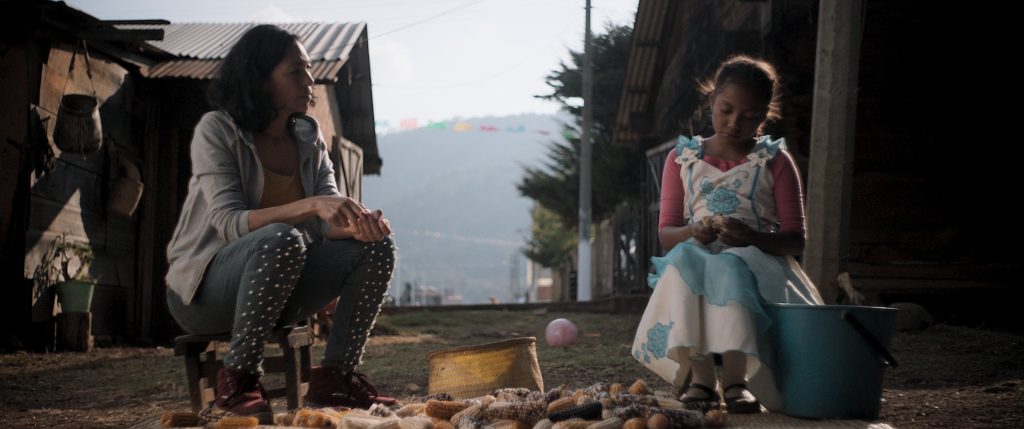The Perfect Candidate (2019 | Saudi Arabia | 105 minutes | Haifaa Al-Mansour)
Haifaa al-Mansour’s latest tells the story of Maryam (Mila Alzahrani), a young doctor facing constant sexism and institutional roadbloacks great enough to push her into exasperatedly running for local political office.
As Maryam struggles to balance religious tradition and cultural norms with honoring what she knows is right and navigating complex family dynamics, her story opens up a valuable, multi-faceted window into the frequently infuriating and exhausting reality of being a Saudi woman today.

Sweat (2020 | Poland | 105 minutes | Magnus Von Horn)
Over the course of three days, a Polish fitness instructor and Instagram influencer watches the carefully curated veneer of her public persona start to crack. Sylwia (Magdalena Koleśnik), whose work life involves dressing in head-to-toe pink and leading fitness classes for adoring fans in the middle of shopping malls (the kind of spaces that would have hosted a Tiffany concert in the 1980s), walking red carpets, and sharing minute-by-minute videos when she makes a smoothie or walks her dog, must navigate difficult family dynamics, sexual harassment and assault, and the stresses of having the kind of job that requires her to be always “on”. The plot takes several unexpected twists and turns as Sylwia stretches closer and closer to her breaking point.
Intimate and super-present camera work, including frequent extreme close-ups of Sylwia’s eyes, is contrasted with an equally frequent positioning of a lens, mirror, or phone screen to mediate our view of her. I’m not sure we ever quite break into the interiority of what makes this character tick, despite the fact that she is ostensibly sharing that information with the world at any given moment: we’re always observing her through an outsider’s lens, so that most of the choices she makes come as a surprise even to those who have been watching with a close eye. The same story written or directed by a woman might have gotten a little more personal rather than remaining so removed and opaque regarding her motivations and true inner thoughts, but even so, the film does present a very believable portrait of the mine fields such a person is obligated to dance through with grace on a daily basis – sometimes by her own design, but often at the hands of forces that feel far out of her control.

Nudo Mixteco (2021 | Mexico | 91 minutes | Ángeles Cruz)
Like the Iranian film There Is No Evil (which just won SIFF’s Golden Space Needle Award for Best Film), Nudo Mixteco is a set of discrete stories about separate characters, very loosely interconnected by narrative elements and more strongly so via themes and ideas. It could almost stand alone as three short films, although the characters and events of each one do briefly cross paths with those in the others.
In all three segments, women are finding ways to step into their power, to finally speak up for what they need and want, all during returns to the small Indigenous (Mixteco) village of Guadalupe Victoria in rural Mexico, during the village’s annual Festival of San Mateo. As noted in SIFF’s live Q&A on Friday the 16th (now attached to the film’s page for on-demand viewing), writer/director Ángeles Cruz hails from this village herself, and many of the actors included are real townspeople from this community.
The first, and least fleshed out, segment of the film centers on a woman named María (Sonia Couoh) who returns home for her mother’s funeral, and reconnects with an ex, a woman who now has a child. María is unwelcome amongst her family because of her homosexuality, but she holds her ground anyway in this place where she knows she belongs. A queer Indigenous woman standing up for herself is a rich, interesting premise, but this segment feels more like a sketch of an idea than a final draft.
The second and third segments spend more time developing their characters and themes in a more overt way. In the second, Esteban (Noé Hernández) returns home from years away working up North, only to find that his wife Chabela (Aida López) has moved on with another man. A town court is convened to dispense justice by way of a majority vote by the townspeople – an Indigenous custom common in rural Mexico, a traditional replacement for more institutional legal structures or written law. A public-square debate ensues about the limits to which a woman is obligated to wait for her husband when he stays away, physically removed and incommunicado, for much longer than planned.
In the third segment, Toña (Myriam Bravo, or actually “Tonya” in the subtitles, which tend to have a pretty inconsistent quality level here) returns from her bigger city life to Guadalupe Victoria to deal with her daughter who is having behavioral problems. Revelations of incestual sexual abuse, and familial enabling via cover-ups, emerge in an emotional night full of accusations and catharsis.
The film’s episodic structure results in the viewer never really getting a chance to deeply connect with any one character, which can be a weakness – but it does lend itself to a wider view, connecting the dots together in a more overarching way rather than focusing on each one more deeply. Taken together, these segments consider how difficult (but possible!) it can be to break from a lifetime or generations of traditions; how just speaking up for your needs can totally shift your situation; and how as a woman, owning and honoring and protecting one’s sexuality is a necessary, if often fraught, task.
Keep up with us during the festival on Twitter (@thesunbreak) and follow all of our ongoing coverage via our SIFF 2021 page.



